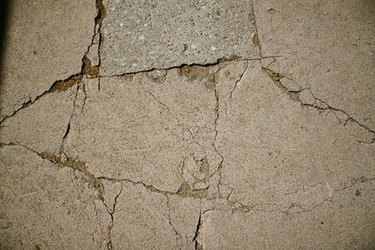Things You'll Need
Spade
Base material (sand, stone chips, Portland cement)
2-by-4 post
Saw
Hand tamper
Broom
Fine stone dust
Water hose

Concrete sidewalk heaves result from water flooding beneath the pavement and freezing. The freezing water expands, pushing the pavement upwards, and causing an uneven joint between concrete slabs. The uneven pavement becomes damaged with use and if left as is will eventually require replacement. You can avoid costly replacement by fixing sidewalk heaves as soon as they occur. The process of fixing the heaves requires that you repair the underlayment beneath the pavement. By repairing the underlayment, you can level the pavement, stave off damage and prevent future occurrence of sidewalk heaves in the process.
Step 1
Exhume the pavement piece that is not level due to heave. Dig around the pavement with a spade to the base of the slab and then pry the slab up from the base surface beneath. A slab 4 inches thick and 2 by 2 feet square weighs about 200 pounds, so you will need help removing the slab. Remove the slab and set it aside for placement once you have repaired the base.
Video of the Day
Step 2
Examine the base underneath the sidewalk pavement so that you can match the material when repairing the underlayment. Common base material used is a dry mix of sand and Portland cement and fine stone chips or just sand alone.
Step 3
Level the existing base. Fill in missing materials until the base is level with the surrounding area beneath adjacent slabs. Level the surface using a wood 2-by-4 post cut to the width of the slab. Pull the post along the surface to move around loose base material and to push excess materials away from the slab's excavation.
Step 4
Compact the base using a hand tamper to add firmness and to prevent the base materials from settling. Hold the hand tamper horizontal against the surface of the base material and pound the material repeatedly until the base no longer compresses. Add additional base material as you compress it until you reach the level of the surrounding base.
Step 5
Place the sidewalk slab back in place on the base material. Stand on the slab and shift your weight around to ensure that there are not any unstable points underneath. The slab should remain stable, not tilting in any direction as you move. Add or remove base material as needed until the slab is stable and level with the adjacent slabs.
Step 6
Fill the joints of the sidewalk pavement by sweeping in fine stone dust and spraying the dust with water from a hose to set in place.
Video of the Day